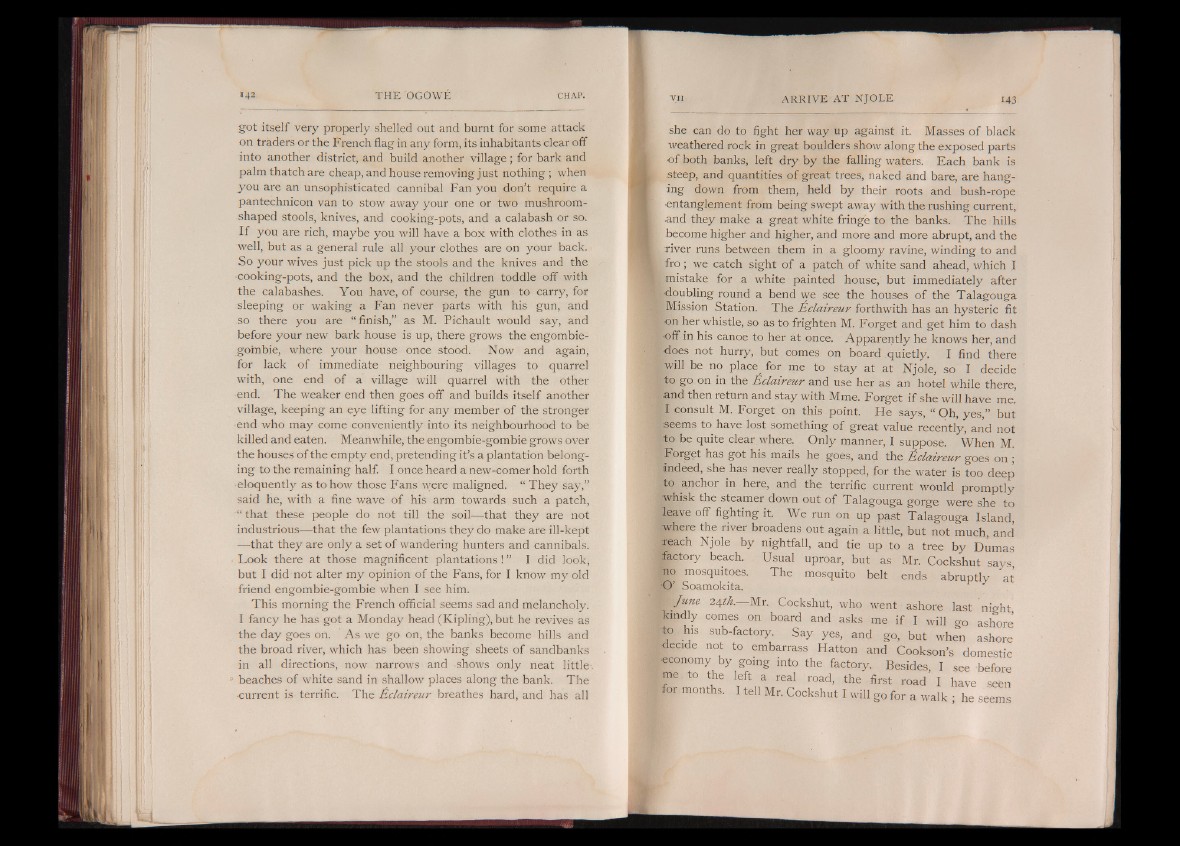
:got itself very properly shelled out and burnt for some attack
on traders or the French flag in any form, its inhabitants clear off
into another district, and build another village; for bark and
palm thatch are cheap, and house removing j ust nothing; when
you are an unsophisticated cannibal Fan you don’t require a
pantechnicon van to stow away your one or two mushroomshaped
stools, knives, and cooking-pots, and a calabash or so.
I f you are rich, maybe you will have a box with clothes in as
well, but as a general rule all your clothes are on your back.
So your wives just pick up the stools and the knives and the
■cooking-pots, and the box, and the children toddle off with
the calabashes. You have, of course, the gun to carry, for
-sleeping or waking a Fan never parts with his gun, and
so there you are “ finish,” as M. Pichault would say, and
before your new bark house is up, there grows the engombie-
gombie, where your house once stood. Now and again,
for lack of immediate neighbouring villages to quarrel
with, one end of a village will quarrel with the other
■end. The weaker end then goes off and builds itself another
village, keeping an eye lifting for any member of the stronger
-end who may come conveniently into its neighbourhood to be
killed and eaten. Meanwhile, the engombie-gombie grows over
the houses of the empty end, pretending it’s a plantation belonging
to the remaining half. I once heard a new-comer hold forth
■eloquently as to how those Fans were maligned. “ They say,”
said he, with a fine wave of his arm towards such a patch,
“ that these people do not till the soil— that they are not
industrious— that the few plantations they do make are ill-kept
— that they are only a set of wandering hunters and cannibals.
Look there at those magnificent plantations! ” I did look,
but I did not alter my opinion of the Fans, for I know my old
friend engombie-gombie when I see him.
This morning the French official seems sad and melancholy.
I fancy he has got a Monday head (Kipling), but he revives as
the day goes on. As we go on, the banks become hills and
the broad river, which has been showing sheets of sandbanks
in all directions, now narrows and shows only neat little
p beaches of white sand in shallow places along the bank. The
-current is terrific. The Eclaireur breathes hard, and has all
she can do to fight her way up against it. Masses of black
weathered rock in great boulders show along the exposed parts
o f both banks, left dry by the falling waters. Each bank is
steep, and quantities of great trees, naked and bare, are hanging
down from them, held by their roots and bush-rope
■entanglement from being swept away with the rushing current,
•and they make a great white fringe to the banks. The hills
become higher and higher, and more and more abrupt, and the
river runs between them in a gloomy ravine, winding to and
■ fro ; we catch sight of a patch of white sand ahead, which I
mistake for a white painted house, but immediately after
■doubling round a bend we see the houses of the Talagouga
■Mission Station. The Éclaireur forthwith has an hysteric fit
•on her whistle, so as to frighten M. Forget and get him to dash
off in his canoe to her at once. Apparently he knows her, and
Bjdoes not hurry, but comes on board quietly. I find there
( will be no place^ for me to stay at at Njole, so I decide
to go on in the Éclaireur and use her as an hotel while there,
and then return and stay with Mme. Forget if she will have me.'
I consult M. Forget on this point. He says, “ Oh, yes,” but
seems to have lost something of great value recently, arid not
to be quite clear where. Only manner, I suppose. When M.
|Forgct has got his mails he goes, and the Éclaireur goes on j
indeed, she has never really stopped, for the water is too deep
to anchor in here, and the terrific current would promptly
whisk the steamer down out of Talagouga gorge were she to
leave off fighting it. We run on up past Talagouga Island
where the river broadens out again a little, but not much and
reach Njole by nightfall, and tie up to a tree by Dumas
factory beach. Usual uproar, but as Mr. Cockshut says
no mosquitoes. The mosquito belt ends abruptly at
O ’ Soamokita.
^m june 24th. -Mr. Cockshut, who went ashore last night
kindly comes on board and asks me if I will go ashore
to his sub-factory. Say yes, and go, but when ashore
¡decide not to embarrass Hatton and Cookson’s domestic
economy by going into the factory. Besides, I see before
me to the left a real road, the first road I have sefen
for months. I tell Mr. Cockshut I will go for a walk ; he seems